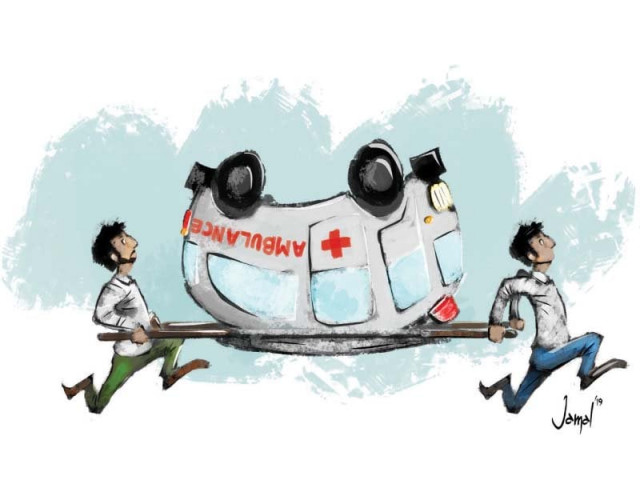Rescue services in Karachi on the verge of collapse
Aman Foundation’s free ambulance service may be shut down as Sindh government fails to make timely payment

ILLUSTRATION: JAMAL KHURSHID
The booths, set up across the city, were the backbone of the communications system of these welfare organisations' ambulance and rescue services. Any calls or messages received for assistance would be directed from the central command system to these booths, which would then relay them to the ambulances closest to the area. The removal of these booths has considerably increased the response time as the ambulances must now be directed from the central command system.
SC orders KMC to present Karachi’s master plan on next hearing
The action has left millions of residents of the port city helpless as the only other alternative - the Sindh Rescue and Medical Services (SRMS) - operated jointly by the Aman Foundation and the Sindh government, simply cannot cope with the high volume of emergency calls.
The numbers
"There are around 1,100 to 1,400 emergency calls received by rescue services in Karachi every day," said Khaqan Sikander, the general manager of Strategic Operations at the Aman Foundation. "The Sindh Rescue and Medical Services normally handles 30% of them," he added.
But with the disruption of the communications networks of other welfare organisations, such as the Edhi Foundation, Chippa Welfare Trust Alamgir Welfare Trust, Saylani Welfare and Falah-e-Insaniat Trust, the SRMS has seen a sudden spike in the requests for assistance.
An unsavoury partnership
In December last year, the Sindh government inked an agreement with the Aman Foundation, creating a partnership for the provision of free emergency rescue services for the citizens of Karachi. Under the agreement, the Aman Foundation's ambulances, which cost around Rs2,000 per trip, would be provided free to citizens and the cost would be borne by the provincial government.
The government was to release the funds for this purpose in advance. The Sindh government then hired an auditor, who was deployed at the Aman Foundation's centre to review the number of calls and responses. The auditor would release a quarterly report, on the basis of which the provincial government would release the funds.
"The Sindh government was supposed to pay Rs359 million for a nine-month period starting December," said Sikander. "Unfortunately, we are still waiting for the last tranche of Rs80 million." Unless that happens soon, the Aman Foundation will no longer be able to run the service.
According to Sikander, the service would be better off if the same payment model was applied to it as in Thatta-Sujjawal, where the Aman Foundation has been working together with the Sindh government for the past three years. "There, the Sindh government releases payments for the whole year," said Sikander, adding that life-saving services can only function in that way. "If we are cash-strapped and struggling to cover our expenses the whole time, we cannot focus on rescue oeprations."
Sikander added that it was a good initiative on the part of the government to launch the service but if the payment mechanism was not rationalised, the service would collapse. He suggested the creation of a public limited company to handle the affairs so that the financial issues could be smoothed.
Meanwhile, the health department routed The Express Tribune's inquiry regarding the reason for the delay in disbursement of funds for the project to the finance department and the chief minister. "We have nothing to do with this scheme," said an official of the health department. "The finance department and the CM House are directly dealing with the Aman Foundation."
When The Express Tribune reached out to the finance department, a senior official admitted that there were some difficulties in making payments for various projects. He attributed the delays to the shortfall in transfers from the federal government. The official, who asked not to be named, added, however, that the issue would be resolved soon after the provincial budget for the new fiscal year is approved.
Par(kings) of Karachi
A precarious situation
This does not, however, placate Sikander. "On the one hand, the other welfare organisations have been seriously affected by the anti-encroachment drive, thereby increasing the volume of calls to our service," said Sikander. At the same time, the foundation has seen a marked decreased in the donations it receives each year. Sikander attributes this to the weakening economy. "I cannot even imagine what we will do in July," he said.
With a serious shortage of funds and the summer heat causing even more life-threatening diseases, the free service will have no other choice but to close shop if the funding from the provincial government doesn't come through.
Published in The Express Tribune, June 21st, 2019.



















COMMENTS
Comments are moderated and generally will be posted if they are on-topic and not abusive.
For more information, please see our Comments FAQ